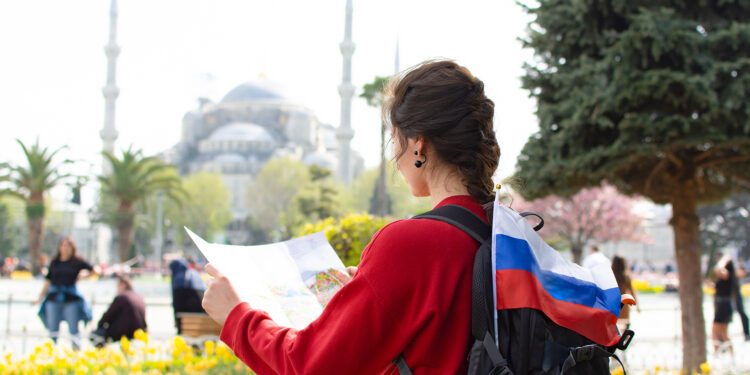Ankara- Turkey has refused to impose restrictions on Russian tourists amid European pressure to punish Moscow over the war in Ukraine, leaving the door open for Russians to top Turkey’s visitor lists.
The Russian news agency Novosti quoted the Turkish economic commentator, Mustafa Recep Ersin, as saying that Turkey is sticking to its position of refusing to make concessions to the West regarding the restrictions imposed on Russian tourists.
Ersin explained that Ankara had set a basic condition that the European Union would not force it to take decisions of this kind, noting that Turkey considers the tourism sector a sensitive priority.
He added that despite the restrictions imposed on the export of some goods and services to Russia, Turkey remains committed to its position of not making any concessions in the field of tourism.
“It is clear that Turkey has sent a clear message to the West: If you force me to restrict trade in goods, I will do what is necessary, but do not demand this from me in the field of tourism,” he continued, stressing that the country has witnessed a greater influx of tourists, especially Russians, this year.
The Russian agency quoted an unnamed source in the Turkish Ministry of Culture and Tourism as saying that the Turkish authorities do not expect major changes in the number of Russian tourists this year due to payment problems, and are counting on indicators similar to previous years.
In this context, political analyst Ahmet Ozgur believes that the Turkish government is able to fulfill its international obligations while maintaining clear limits on requests that may harm its national interests.
Speaking to Al Jazeera Net, Ozgur pointed out that Russia was among the three countries that exported the most tourists to Turkey during the past five years, which has become a fundamental pillar of support for the Turkish tourism sector.
Ozgur believes that Türkiye should reject such requests that may negatively affect its interests.
Turkish tourism sector
The tourism sector has become a major lifeline for the Turkish economy amid the country’s economic challenges, including a high annual inflation rate of 71.6% in June and the continued decline in the lira exchange rate.
Despite the challenges of rising tourism costs due to inflation and the repercussions of racist campaigns that the country has witnessed in recent years, Turkey was able to attract 21.06 million tourists during the first six months of this year, achieving an increase of 10.33% compared to the same period last year.
In terms of revenues, the tourism sector witnessed a growth of 5.4% in the first quarter of this year, compared to the previous year, bringing revenues to $8.78 billion, according to data from the Turkish Statistical Authority.
The tourism sector reached a record level in 2023, with 49.2 million foreign arrivals generating a huge income of $54.32 billion, up from $46.48 billion in 2022, and the government expects the number of tourists to reach 60 million this year, with an expected income of $60 billion.
Russians top the list
Russia ranked first in the number of foreign visitors to Turkey during the first half of this year with 12.42%, more than 2.68 million visitors, followed by Germany in second place with 11.40%, while Britain came in third place with 8.19%, and Iran and Bulgaria came in the following ranks, according to data from the Turkish Ministry of Culture and Tourism.
During the same period, the city of Antalya (southwestern Turkey) recorded a 13% increase in the number of tourists compared to the same period last year. Despite the ongoing war with Ukraine, Russian tourists ranked first among the nationalities that visited the city the most, as their number increased by 9%, equivalent to 592,268 visitors, making up 22.93% of the total number of tourists.
Russia ranked first in the number of tourists arriving in Turkey last year, as the number of Russian visitors reached 6.31 million tourists, after Russia was ranked second after Germany in 2022, when it recorded 5.23 million visitors.
Average spending per tourist rose to $952 last year, compared to $905 in 2022, while average daily spending increased by 12% to $99.
high cost
In this context, the Russian Ambassador to Turkey, Alexei Yerkhov, confirmed that Turkey is still a favorite destination for Russian tourists, pointing to the great interest shown by Russians in traveling to it, expecting that the number of Russian tourists who will visit Turkey by the end of 2024 will exceed 6.4 million visitors.
The ambassador expressed his concern that accidents involving tourists, especially traffic accidents, cast a negative shadow on Turkey’s image as a tourist destination, and pointed out that the inability to use Mir bank cards reduces the level of comfort for tourists.
Yerkhov stressed that statistics show that Russia continues to have strong interest in Turkey as a tourist destination, but he pointed out that the sustainability of this interest depends largely on Turkey itself, indicating that this includes the role of Turkish travel agencies and hotel management companies, especially with regard to reasonable pricing policies.
Economic analyst Ismail Karagöz said that the Turkish Ministry of Culture and Tourism’s announcement of 2024 as the Year of Alanya (in Antalya province) indicates strong expectations of an increase in the number of Russian tourists who prefer this city in particular.
He added in a comment to Al Jazeera Net that the consumer budget was negatively affected by the Russian-Ukrainian war, which coincided with the need for tourism operators in Turkey to raise prices to maintain quality, which led to an increase in complaints from Russian tourists about the increase in prices in Turkey, but it is a destination that Russians continue to see as reasonably priced for spending holidays.



